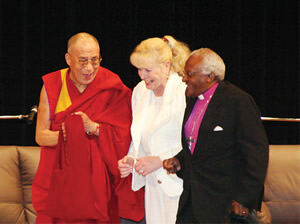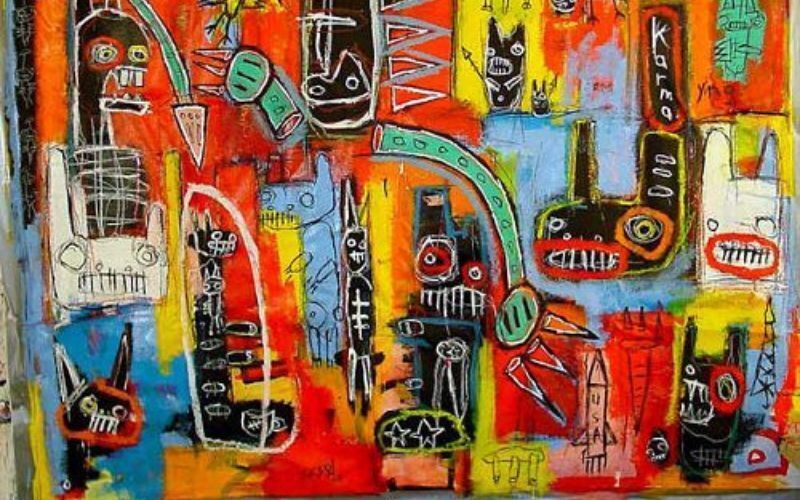Nobel Peace Winners In Japan Argue For Nuclear Ban
Hiroshima, Japan
November 14, 2010
Former Nobel Peace Prize winners at the Hiroshima Memorial
Nobel Peace Prize laureates including the Dalai Lama argued for a world without nuclear weapons Sunday at a ceremony in the Japanese city where the first wartime atomic bomb exploded 65 years ago.
The somber event marked the end of a three-day meeting of peace prize winners. It was tinged with joy at the news that Myanmar democracy leader and fellow prize winner Aung San Suu Kyi, detained for more than 15 of the last 21 years, was freed Saturday evening.

"Past is past, now we must look forward," said the Dalai Lama, the Tibetan spiritual leader. "We must utilize dialogue, with the spirit of reconciliation. That is the only way to solve problems. Using force is outdated."
The laureates also expressed dismay that this year's recipient, Chinese dissident Liu Xiaobo, remains in jail.
The peace prize winners laid a flower wreath and bowed their heads at a monument to the victims of the atomic attack as Hiroshima's eternal Peace Flame burned in the background. The ceremony was attended by about 7,000 people, according to city officials.
Jody Williams, who won in 1997 for her work to ban landmines, read a joint statement by the laureates calling for a nuclear arms ban.
"Nuclear weapons cannot be disinvented, but they can and must be outlawed, just as chemical and biological weapons, landmines and cluster munitions have been declared illegal," she said.
The annual World Summit of Nobel Peace Laureates assembles past award recipients to call attention to their achievements and push the prize's overall message of human rights and nonviolence. The previous 10 meetings were held in Europe, but organizers chose Hiroshima this year to underscore the anti-nuclear theme.
Laureate Frederik Willem de Klerk, the former South African president, said next year's meeting will probably be held in Washington, although the theme has yet to be decided.
Former Italian soccer star Roberto Baggio received an award for his efforts for charities, including pressing for the freedom of Suu Kyi.
A group of atomic bomb survivors, or "hibakusha" in Japanese, were also recognized for their efforts to promote peace in the decades since World War II.
"We will always believe in the promise of mankind. Until the end, we will never give up," said Sunao Tsuboi, head of the Japan Confederation of Atomic Hydrogen Bomb Sufferers.
This year's event included well-known Beijing critics the Dalai Lama, a former prize winner, and Wu'er Kaixi, a student leader at 1989 protests in Tiananmen Square who is a colleague Liu.
It coincided with Chinese President Hu Jintao's visit to Japan for an Asian economic summit, and Japanese officials were careful to avoid publicly associating themselves with Wu'er to avoid trouble with Beijing. Liu's selection by the Nobel committee has infuriated the Chinese government.
Just outside Hiroshima's Peace Memorial Park, where the ceremony occurred, a group of demonstrators gathered and shouted slogans in Chinese, calling for more pressure on that country's government.
Tensions between Japan and China have been high in recent weeks after a naval collision near disputed islands, but appeared to ease after their leaders met Saturday at the economic summit in Yokohama, near Tokyo.
President Barack Obama, also in Japan for the economic summit, declined to attend but praised the meeting's efforts. Obama received the peace prize in 2009, in part for his efforts on, nuclear disarmament, but some were critical of him on Sunday.
"Obama has disappointed a lot of us. He has not given us that leadership that the world is desiring," said Mairead Corrigan Maguire, peace prize winner in 1976 for her work to end sectarian violence in Northern Ireland.
There were six laureates in attendance, including the Dalai Lama, Williams, de Klerk, and Maguire. The others were Egyptian Mohamed ElBaradei, 2005 winner for his efforts to divert nuclear resources from being used in weapons, and Iranian lawyer Shirin Ebadi.
This article was originally posted on Associated Press.

